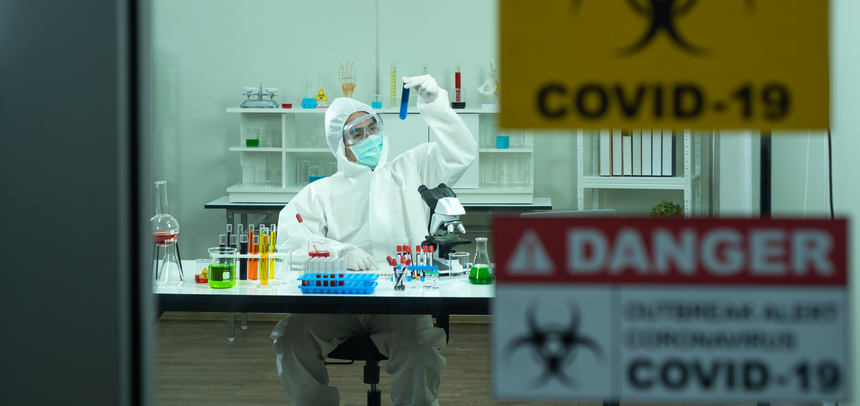Four Ways to Reduce Risk for Medical Labs in COVID Era

As the world continues to battle the COVID-19 global pandemic amidst new variants, vaccination programs and uncertainty in just about every aspect of life, medical labs remain on the front lines. It’s important for these entities to protect themselves as much as possible from the inevitable risks that come with a situation of such magnitude. Here are the top four ways that medical labs can minimize risks moving forward.
4 Ways for Medical Labs to Reduce Risk
1. COVID Lab Insurance
It’s critical today for laboratories that conduct COVID testing to carry medical lab insurance. Both general and professional liability insurance policies are recommended to protect labs against claims filed against them as a result from incidents that may occur during daily operations or employee actions.
General liability insurance protects medical labs from costs associated with third party bodily injuries or property damage. Medical expenses and legal fees would be included and can help shield a medical lab from the financial repercussions from a legal allegation.
Professional liability insurance, on the other hand, protects a medical lab against claims regarding negligence and errors. Affected individuals may file a suit claiming a lab has caused them financial hardship due to a mistake or omission. COVID lab insurance that operates as a professional liability policy provides protection from such mistakes.
2. Focus on Employee Exposure
Another significant risk for medical labs is the potential vulnerability of employees contracting COVID-19 at work.
According to current Centers for Disease Control and Prevention (CDC) guidelines, “fully vaccinated staff should wear a face mask when in an area with potential risk of substantial or high transmission of COVID-19.” Those who are unvaccinated or not fully vaccinated, should wear face masks and practice social distancing.
Medical labs can also ensure that the number of people in a specific area is minimal, allowing safe paths for access and exit.
Heightened cleaning and sanitation procedures should be in place for high-touch, high-traffic areas such as countertops, desks, and other shared surfaces. Finally, a lab should create a plan of operation for exposure, a process to minimize spread of the disease to others including isolation and quarantine of exposed individuals, and suggestions for immediate testing and treatment to avoid severe symptoms for employees.
Workers comp and other types of coverage do not typically cover COVID routine community-spread illnesses like a cold or the flu.
3. Diagnostic Test Evolution
Since the beginning of the pandemic, the type, availability and accuracy of COVID tests have been studied, questioned, and challenged. In order to reduce risk, medical labs dealing with COVID-19 related lab specimens must continue to stay on top of the latest studies and developments to ensure that diagnoses are as accurate as possible.
According to the Journal of Diagnostic Medicine, “the classic COVID-19 presentation of a febrile respiratory illness warrants confirmatory testing.” However, this testing may either be unavailable or may produce a false-negative result. Since testing protocols have been in rapid development over the last nearly two years, there remains variation, availability and reliability of COVID tests.
Today, a myriad of tests are available, and labs must ensure they are using the “correct specimen type and laboratory-testing technique in the right clinical scenario,” warns an article published by U.S. National Library of Medicine. Understanding the difference in diagnostic performance for multiple specimens as well as their performance characteristics of testing techniques will be an important training ground for labs. The article points out that “ucleic acid amplification tests, antigen detection tests, antibody detection tests, and point-of-care tests” are all used today.
4. Cybersecurity Protection
It’s not uncommon to see news about healthcare data breaches today. COVID lab insurance that protects damages from such cyber attacks can be another way to reduce risk for medical laboratories.
Medical records can contain a great deal of personal information and are frequently stored on legacy computer systems that may be vulnerable to attacks. If medical labs receive or transmit private patient data, they can be at risk for breaches that occur.
If cyberattacks result in a patient’s inability to receive lab results and receive needed treatment, this can cause a major risk and vulnerability to the medical lab as related to patient health and safety.
Here to Stay
Despite rising hopes of many, it appears that COVID-19 will be ongoing for quite awhile. Medical labs will continue to play an important role in battling the global pandemic. However, it’s important that they take adequate steps to protect themselves as a business as well as shield their employees by securing COVID lab insurance, taking steps to heighten hygiene and minimize employee exposure, sharpening their understanding of the rapidly evolving test protocols and procedures, and considering cybersecurity insurance protection.
Taking these steps can go a long way in helping minimize risks for medical laboratories that are in the midst of serving those affected by the coronavirus pandemic.
Get Covered
NOW Insurance provides insurance that’s simple fast and affordable to medical labs and testing sites across the country. Get an online quote today in under 3 minutes with our easy online application.